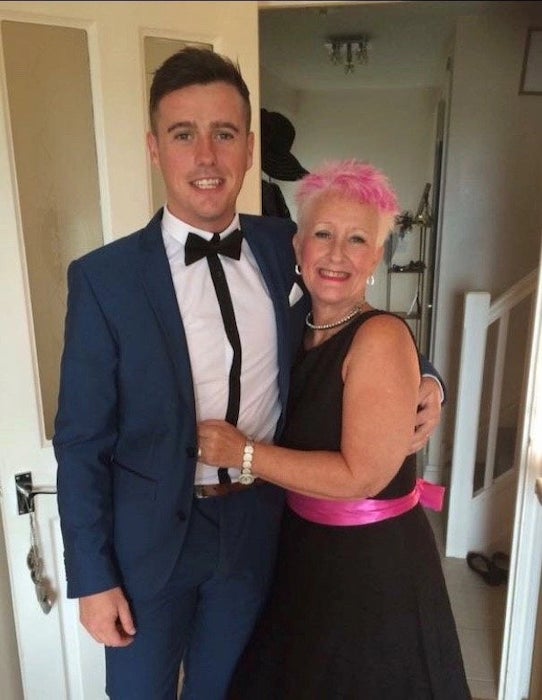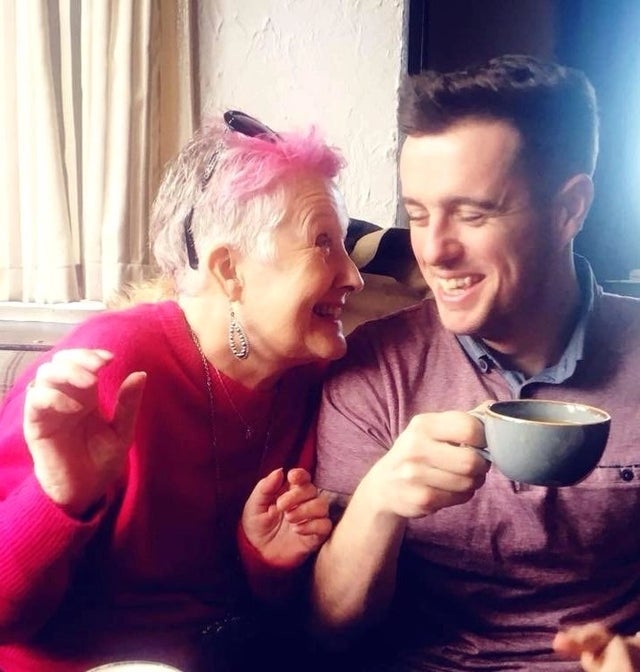Most of us think of experiencing grief after a death, not before, which means anticipatory grief is less talked about
Most of us think of grief occurring after a death. But anticipatory grief, or pre-bereavement, the painful emotions we feel before death, is experienced by many people facing the impending loss of a loved one or their own death. But as this experience is spoken about less often, some find it difficult to express the deep pain they are feeling and fail to receive the support they need.
Claudia Tanner spoke to Max Cassily, a 28-year-old area manager at Aldi, from Canterbury, Kent, about how he and his family dealt with his mother Nanda’s terminal illness at 54.
My dear mum was diagnosed with sarcoma, a cancer of the bone and soft tissue, in 2017. She’d shrugged her symptoms off as back pain.
She’d had cancer – of the breast – two years earlier and we thought we’d been through it all and it was over, she’d beaten it.
But this time around, the doctors told us straight: it was incurable. Our lovely, kind mother was going to die. They said she had three months left.
I remember just after we were told the bad news, all four of us – myself, mum, my dad Steve and my sister Ruby who is two years younger than me – all hugging and crying as we sat on a hospital bed.

They say there’s five stages of grief – denial, anger, bargaining, depression and acceptance. Perhaps because we had dealt with my mum having cancer before and we had already felt all the anger and sadness, we were able to move more quickly to the acceptance stage. It was dad who said to us something along the lines of “We have got to do this, and accept this is happening.”
We knew we had to embrace this, talk about it, plan for it, cry about it.
I remember leaving the hospital, and the daughter of a woman with Alzheimer’s who was in the bed next to my mum hugged us and said she had loved sitting and listening to our conversations.
Open attitude about death
Last time it was all about staying positive and helping mum pull through. We knew this time, that approach wouldn’t help at all. It was a difficult decision to stop “fighting” her illness, but this was part of the process of accepting what was happening.
You may feel angry, mum was too young to go. It wasn’t fair. But you are so sharply aware of the fact there is little time to waste. Mum was going to die and we didn’t have long. We wanted to cherish the precious time we had left with her and make the most of it. Mum lived 180 miles away from me in Eastbourne, so I arranged with my employers to allow me my two days off a week to be taken together so I could spend quality time with her.
We took a really open attitude to talking about death and making practical arrangements. We announced on Facebook and other methods to everyone who knew Nand, as she was know , that she didn’t have long left and invited people to come visit our house week in, week out.
Mum had been a drama teacher who had spent half her time in Cyprus. People from all over, some she hadn’t seen for years, were grateful for the chance to say goodbye. They would apologise for breaking down, and we’d assure them it was okay. It’s only human to get upset.
We talked with mum about what funeral arrangements she wanted. She wanted to be cremated. She loved pink and was known as “The Pink Lady” due to her hair colour. She wanted a pink casket and a pink hearse. We were able to find the first but not the latter – there mustn’t be the demand for them!
She didn’t wan’t the flowers to go to waste and be cremated with her. She requested that everyone take a single stem home with them to enjoy.
Video camera to cherish memories
We had set up a video camera to record our chats with Mum. This helped with the practical side of remembering her wishes. It also allowed us to cherish the memories she shared.
There were plenty of tears, sad ones and happy ones. It was difficult watching her break down and grieve her own death.
But there were positives. It was a time to learn more about my mum’s past. I knew dad didn’t have a great memory so I wanted to take the chance to ask her all about her childhood and upbringing.
Mum was 26 when she met dad and he was just 18. It was unusual in those days, and she was the one who dealt with the more adult things – she was the breadwinner who got them their first house.
At one point, she looked deep in thought and she turned to me and my sister and she said, “You are all okay, you’re all happy aren’t you?” She knew Ruby had her boyfriend and child. She told me I was going to marry my girlfriend Nina. To be honest, I hadn’t even thought of marriage at that point. But mum, you were right, Nina and I tied the knot earlier this year.
Saying goodbye

‘Talk about everything. It won’t change the fact that someone you love is about to die; but I promise you, it will certainly help’
We had lots of trips out, coffees and lunches, until mum got too tired and wanted to stay indoors. The last month was hard watching her struggle for breath.
On 27 February 2018, mum was rushed to A&E. She passed away while I was travelling in a desperate rush to get there on time. I remember balling my eyes out while driving, and not wanting to stop as I wanted to get to the rest of my family as quickly as possible.
I’d never seen a dead body before. I found it really helped to see Mum’s. She looked so peaceful and not in any pain, in stark contrast to the last few months.
Over 250 people attended her funeral. We live streamed in on Facebook and thousands watched it from 21 different countries.
I found it so comforting to watch back the videos of Mum in the months after her death. I got to see her laughing at jokes, crying at the situation, chatting about her first house that she bought 30 odd years ago. Just seeing how she was in her normal, every day life was lovely.
I started a blog about grieving to help other people deal with loss, which can be found here. It can be so easy to go into denial and not face difficult emotions when someone you love is dying. If I can help one person going through the same, that would be great.
Talk about everything. It won’t change the fact that someone you love is about to die, but I promise you, it will certainly help. I had felt I had to be “the strong one” to help everyone else out. So when someone asked how I was, I’d say “Yep, I’m fine”, when really I wasn’t. So I called a men’s mental health line. It helped to speak to someone I didn’t know.
Pre-grieving is an absolute emotional rollercoaster. At times you’re going to be frustrated, sad, angry and even happy, and that’s fine.
Max’s tips when facing a loved one’s death
Max’s blog outlines several pieces of advice:
- Talk – if you don’t feel comfortable sharing with someone close speak to a professional. It’s okay not to be okay.
- Capture you loved one on video – not only does it encourage you to talk through things, it also means you have memories on record and it can be a comfort to watch your loved one when they are gone.
- Look after yourself – you cannot expect to look after and support your loved one if you don’t look after yourself.
- Encourage people to say their goodbyes – it’s a chance to reminisce about old times and just generally have a laugh and forget about death.
- Plan the funeral with your loved one – you’ll find comfort in knowing you’re following their wishes.
- Embrace normality- try and do normal things as much as possible. Go for coffees, shopping, a meal, have friends over, watch TV, get a takeaway, and so on. A loved one with cancer is still a loved one, so, when possible, treat them the same and do the stuff you always used to do together.
Complete Article ↪HERE↩!
